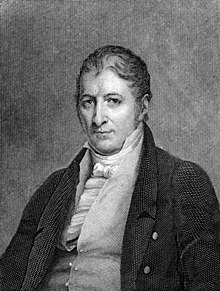Eli Whitney
Eli Whitney (b. December 8, 1765 in Westborough, Province of Massachusetts Bay; † January 8, 1825 in New Haven, Connecticut) eldest son of Eli Whitney Senior, a successful farmer, was a U.S. inventor and manufacturer, and is considered the founder of exchange construction. He is also credited with developing the first cotton gin (egrening machine) in 1793. The gin was a mechanical device that separated the seeds from the cotton, a process that until then had been extremely labor intensive.
In 1792 he graduated from Yale University. On January 6, 1817, he married Henrietta Edwards and had four children with her.
Whitney's greatest contribution to American industry was the introduction of interchangeable construction and the assembly line, which he was the first to use to produce muskets for the U.S. government. Whitney's factories at the time supplied 10,000 standardized muskets at a unit price of $13.40. He probably borrowed the idea for this manufacturing process from the French gunsmith Honoré Blanc. Whitney's concepts culminated in the "American System" of industrial manufacturing, that is, a rational mechanized production of interchangeable parts. These methods were later used in production by Henry Ford and others.
Historians have ample evidence that Catharine Littlefield Greene greatly influenced the invention of the cotton gin - or at least its conception. Evidence shows that she inspired Eli Whitney to create the Cotton Gin and provided material and financial support for the development of the machine. The patent, dated March 14, 1794, was long litigated because resourceful artisans had brought replicas of the machine to market. Catharine Littlefield Greene received royalties from Eli Whitney, which proves her share of the patent. Whitney himself never capitalized on the patent.
Although his ideas were inventive and useful, many others copied the concepts and designs wantonly. Whitney's company ran into considerable trouble in 1797. He never patented his more recent inventions, such as a milling machine.
By the end of 1790, Eli Whitney Jr. was in debt and headed for bankruptcy. In addition, his factory in New Haven burned down. The American government gave him another chance and contracted with him in 1798 to supply 10,000 muskets. Whitney, who had never manufactured weapons, developed the principle of standardized production of interchangeable parts and defended this until his death in 1825.
In 1818 he developed the first milling machine for metal. The machine bed (base body) consisted of a block of wood. The milling table could be moved either manually or automatically by a worm drive.
Eli Whitney Jr, the only son of Eli Sen, was born Nov 20, 1820. He was four years old at the death of his father.
The firm was continued by his nephews Philos Blake and Eli Whitney Blake (1795-1886) until 1846. Trustees thereafter for another eight years were Henry W. Edwards and James Goodrich. After studying at Yale and Princeton and graduating in 1841, Eli Whitney Jr. returned to New Haven and took over his father's gun factory.
In 1847, he manufactured the famous Colt Whitneyville Walker percussion revolver under contract for Samuel Colt, who did not yet have his own manufacturing facilities, and became one of the important arms suppliers in the American Civil War.
After being in the family for 90 years, Eli Whitney Jr.'s grandson, Eli Whitney IV (1847-1924), sold the gun factory to the Winchester Repeating Arms Company in New Haven in 1888.

Eli Whitney Jr.
Search within the encyclopedia